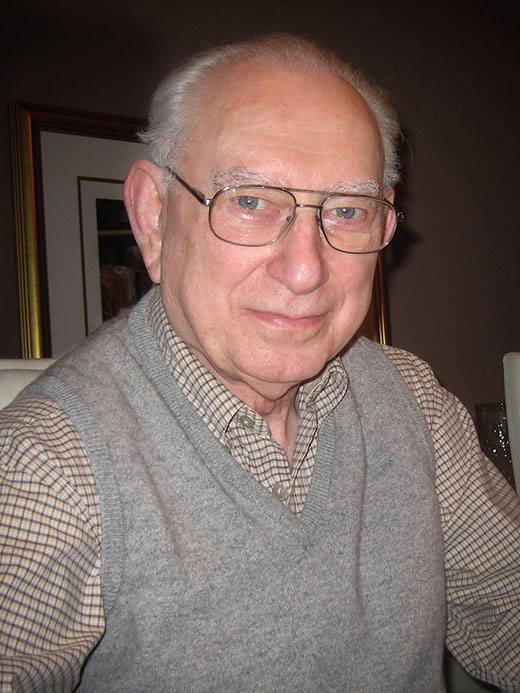BY CLARE HOWARD
As a wave of anti-Semitism sweeps the nation, Peoria’s Holocaust Memorial is being relocated from a shopping mall to the heart of downtown on the southwest corner of Peoria Riverfront Museum.
Composed of a series of clear glass columns filled with buttons for each victim of the Holocaust, the memorial graphically symbolizes the enormity of 11 million people systematically murdered. There are button-filled columns to represent the six million Jews who were killed. Separate columns filled with five million buttons represent political dissidents, homosexuals and others who were killed.

Manfred Katz will speak at Peoria Riverfront Museum April 23 at the rededication of the Peoria Holocaust Memorial.
A man who sees his own family symbolized by the six million buttons is Manfred Katz.
Now 89, Katz will speak in Peoria as part of the rededication ceremony 2 p.m. April 23, Holocaust Remembrance Day.
Katz said he is not surprised by the current wave of anti-Semitism but still holds hope it will not fester and grow.
“Jews have been struggling for millennia. Being an engineer and living by numbers, I believe numbers repeat themselves,” he said.
The only way to break that cycle is for everyone to take a stand “because this is not just a Jewish problem or a racial problem. It is a global problem,” he said.
Katz was 13 when he and his parents and younger sister were incarcerated and deported from Germany to Latvia. He saw his parents for the last time when he was 15. He was sent to two concentration camps, first Kaiserwald in Latvia and then Stutthof outside Gdansk.
Toward the end of the war, as the Russian army was progressing west, Katz and about 400 other prisoners from Stutthof were forced on a “death march.” For two months from January to mid-March 1945, they walked through snow wearing only their prison uniforms, no socks, no winter clothing.
“We were not marching. Not walking. We were dragging along,” he said.
When prisoners died, their bodies were left in the snow.
One night, the German guards disappeared. They fled when they learned the war was ending. Although Katz and about 75 others had survived the march, they had no resources, no families to return to and no support network.
Katz had weighed about 120 pounds before he and his family were arrested. At the end of the war, he was about 5-feet 7-inches tall and weighed about 65 pounds.
He continued walking west, reached Frankfurt, Germany and started working for the U.S. Army in the American zone of Frankfurt.
He began looking for an older sister who had escaped to America. In May 1946, he arrived in St. Louis and was reunited with his sister.
“I was a novelty. People came by to look at the refugee,” he said. “There were a lot of Jewish folks in St. Louis, and they wanted to know what had happened. They just couldn’t believe what I told them. They thought I was dramatizing when, in fact, I was holding back more of the cruel acts.”
The disbelief in his accounts led Katz to stop talking about the war altogether. He finished high school, went to college, earned a degree in mechanical engineering and spent his career working in the aerospace industry.
It wasn’t until 1990 when his sons were adults that he started telling his wife and children about his experiences.
“My wife knew, but she didn’t know the details,” he said. “They were able to ask me questions. Then I started speaking publicly. The world needs to know.”
He called the current climate of hate “very, very scary.”
He points out facts and evidence in his presentations and tries to combat Holocaust deniers. Asked about a petition against Amazon to force the Internet company to stop selling books that deny the Holocaust, Katz said he’s ambivalent.
“I hate to see the press restrained in any way, but that topic should be off limits,” he said.
His daughter-in-law Susan Katz is executive director of the Jewish Federation of Peoria and helped organize the rededication ceremony.
“My father-in-law Manfred is an incredible and very loving person. He overcame immense obstacles to survive the Holocaust, come to this country and then proceed to get an education and provide generously for his family. He takes tremendous pride in his family; his children, grandchildren and all of his daughters-in-law and is very thankful for all that life has given him,” she said. “I find it amazing that at the end of his presentation, he concludes that he has had a blessed life.”

Recent Comments